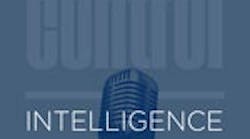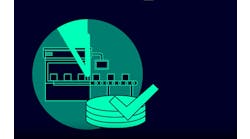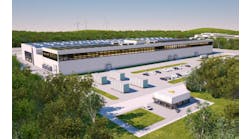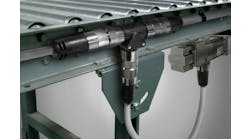STEM update: Austin Park 4 years after receiving Acopian Power Supply Scholarship
In 2017, Austin Park had received a bachelor of science (BS) in electrical engineering from UCLA and was beginning his master's degree at Stanford University, where he was accepted into the masters of science (MS) program in energy resources engineering. He was also the recipient of Acopian Power Supplies' first-ever scholarship the same year. In this episode of Control Intelligence, digital engagement manager Amanda Del Buono catches up with Park to find out where is now and how the scholarship helped him reach his goals.
Read about this year's Acopian Power Supply Scholarship winner.
Transcript
Amanda Del Buono: Hello, welcome to Control Intelligence, the podcast from Control Design that goes deep inside the automation and technology that machine builders, system integrators and end users rely on to keep production running efficiently. I'm Amanda Del Buono, digital engagement manager on Control Design, and today I'm joined by Austin Park, machine learning engineer at Gridmatic and the winner of the first ever Acopian Power Supply Scholarship.
The strain on workforces has never been more apparent than after the COVID 19 pandemic. As an experienced workforce starts their well-deserved retirements, it's more crucial than ever for the new generation to be encouraged to fill these open positions. To further encourage STEM education and careers, Acopian Power Supplies has recently awarded Yoelis Brito of Newark, New Jersey with its Annual Power Supply Engineering Scholarship.
The scholarship was established in 2017 to help engineering students pursue careers in power electronics, or related engineering disciplines and was presented to Austin Park as the first recipient. Today, I'm catching up with Austin to see where his education led him and how the Acopian Scholarship helped him to reach his goals. Hi Austin, thanks for joining me today.
Austin Park: Hi Amanda, thanks so much for having me
Amanda: Just to get started, you were the first to be awarded Acopian Scholarship. Can you kind of just update us to where you are now?
Austin: Sure. So currently I work for a startup called Gridmatic. We are an AI-driven startup that works on modeling uncertainty in electricity systems, and that of course can mean many, many different things. But what we do is we use machine learning models to model and quantify the uncertainty in the load and renewables in various electricity systems in U.S. markets. And then we use that to submit automated bids and participate as virtual electricity market participants.
So primarily, the electricity markets have these operators and they're called ISOs or RTOs. And there's various large regions in the U.S. that are covered by different electricity markets. But for example, in like the Midwest, it would be MISO; in California, it's CISO; and there's many others. And so that's the clearinghouse for all the bids and offers that exist in this market.
So when we act as virtual participants, we interact primarily with them and they are accepting and balancing bids and offers between all the different market participants. So all of the generators, renewable, and gas and coal, and all of the load that's supplied, so all the utilities that are bidding in for that need power and don't supply it all with their own generation stack.
So those are the primary partners. We are also developing other lines of business that are related that can use the same technology, which is essentially better forecasting for what's going to happen. So, shrinking the error bars around wind, solar and load in the like 24 to 48-hour timeframe so that system planners and ISOs can better understand how to balance the grid and it creates value for any of the market participants.
So, you know, it could be all of those parties I just described, it could be generators, it could be load and a really interesting space that's just starting to grow is battery storage. They're a very interesting participant because they have the ability to act as generation or as load and they have lots of flexibility. And so they can take advantage of better forecasts and better understanding of what's going to happen in the short term time horizon.
Amanda: That's really interesting.
Austin: Yeah. It's an exciting time to be part of the energy industry at large. You know, the grid is undergoing a massive transformation right now from in many different ways. So, you know, we're moving from centralized generation to more dispersed generation. So these large coal and gas plants to, you know, still not small, but certainly more distributed wind and solar plants. And then also, you know, extremely distributed rooftop solar systems. And then we're transitioning from this kind of like central control idea where you have the ISOs or the RTOs that help operate the system. Of course, they're still going to operate the system, but they will get more data streams and more feedback from the different participants rather than just kind of having it be fully determined by them.
Amanda: Right. Right. Well, jumping back to 2017, you planned to use the scholarship for expenses that you were accruing, as you began studies at Stanford, where you were accepted for a master of science program for energy, resources and engineering. It sounds like you kind of made it to your goal working in the energy industry. Can you kind of talk to us about your studies and how that brought you to reaching a position where you're working in the energy industry?
Austin: Yeah. Absolutely. Be happy to. So when I received the scholarship, I knew I wanted to work in energy and that was primarily motivated by an interest to address climate change in a very high impact way. So, you know, if you address the emissions associated with energy use in production, then you've addressed 75% to 80% of the climate problem. So that was obviously a big driver for me.
And then I kind of pursued that immediately, because I knew I wanted to go into it. And it led me to study this program that was really, it was very technical. It was lot of math and computer science and kind of fundamentals of renewable energies. So, you know, think like thermodynamics and a little bit of circuits, all sorts of fun, various fields of engineering that kind of collide in energy.
And as I started this study, I realized, you know, it's great to have some domain knowledge of different pieces of the energy industry, but what I really needed to bring to the table to have a high level of impact was a specific skillset that could be leveraged and scaled well, and it's hard to think of anything that scales better or can be used more effectively than software. And in particular at Stanford, there's a huge focus on software.
So, you know, each of my classes were requiring coding in some form or another. And I had never done that much coding beforehand. So I was, you know, fairly green in that field. I'd done a little bit in my undergraduate engineering, but the main focus there was on pen and paper kind of problem solving. So when I started to take more coding classes, I kind of had this moment where I had to decide like, is this going to be a necessary part of the degree that I'm going to grind through and, you know, to get to where I want to go or am I going to lean into this and kind of pursue it more intensely and volunteer for more classes to really round out my computer science knowledge and I decided on the latter. And so I started to take lots and lots of different computer science courses with a focus on machine learning and applying more advanced modeling techniques to energy spaces. And that's kind of where I am today.
Amanda: Awesome. That's really exciting to see you, you know, setting that goal for yourself and getting there. Acopian obviously deals with power supplies. How do you feel getting that scholarship to help influence your studies as a graduate student and maybe influence your career that has followed?
Austin: Yeah, absolutely. So, I remember when I got the scholarship, the first thing I did was I went out and bought a new computer. And so that was obviously fundamental for computer science education. And it was very, very helpful to have something that had more up-to-date technology than what I'd been using in undergrad, which was at that time kind of falling apart. So the scholarship was very helpful to be able to afford a good quality computer that had enough RAM to kind of take some of the more intense compute workloads that I was throwing at it. So thank you very much for the scholarship.
And I think maybe more broadly, getting the Acopian Scholarship, just underlined that there's a lot of interest and a lot of need for STEM education. And there's a lot of power that can come out of, not to create a pun there, but a lot of power that comes from focusing on STEM in undergraduate and graduate education. Even if you don't end up going into a technical route, it prepares you to kind of think about the world with a concrete set of steps to problem solve in a lot of different abstract spaces.
So for my specific career, it gave me kind of tools to carry out the education that was explicitly, you know, designed to work on those tools, namely the computer. And it also gave me kind of a reinforcement of perspective that STEM is valuable and we need good engineers to solve tough problems.
Amanda: Absolutely. Well, to kind of piggyback off that, you know, you were the first to win it, it's continued on annually. Why do you think other engineering students should reach out to these companies to do the same? And along with that, what do you think that the value is for the companies that are lending a hand to these students as they're entering STEM education and hopefully STEM careers?
Austin: I would start by saying, there's no better investment than in education. I think I remember seeing studies that suggest that every dollar invested in education, usually from public sources, not private, but results in up to $7 of return. And obviously education is really important as we transition more from a goods-based economy to a service-based economy. I guess more specifically for my story winning the award, allowed me to not have to think as hard about whether I was going to need a job during graduate education, in addition to research responsibilities and taking really hard classes.
And so just having that focus, like the ability to kind of have a one-track mind when I was thinking about my studies was really, really valuable. And I guess as more broad encouragement for people who are thinking studying engineering, you know, the world faces a tremendous number of problems and that can be scary and it can also be exciting, you know.
And so the domain I chose to focus on was climate change, where we have a really, really short timeframe to address a lot of issues. So,, we're looking at to get on a track for 1.5 degrees of warming by 2100, we have to half emissions by 2030 relative to 1990. And what that means is an intense focus on all the kind of low hanging fruit and all of, you know, some of the more difficult problems that is going to require.
You know, it'll take a lot of pieces of the puzzle. It'll take a policy of support, it'll take nonprofit advocacy, but it'll definitely take engineering solutions. And we're still developing a lot of the solutions that we'll need to ultimately get to those kind of long term emissions goals. And, and I'm sure in other domains that there are important challenges and things that really the world is crying out for that engineers can help solve.
Amanda: Absolutely. Well, you know, we kind of spent this time looking backwards, but looking forward, what are some of your short term and long term professional goals?
Austin: Sure. So, I mean, in the short term, I'm still in the stage where I'm very much skill building, so I loved my graduate education. It was definitely a grind. It's definitely hard, but I got a lot out of it and I actually continue to take classes right now in the machine learning domain because it's really fast moving space. So short term, I want to become a true expert in the field of machine learning, you know, rather than an entrant or a kind of an early stage learner.
So, that's kind of in the short term about building and rounding out my technical skills and then longer term it's really mission-driven. I would like to have a substantial impact on climate, through emissions reductions. And, you know, there are very clear scientific goals, very clear sign posts of, you know, these targets that we have to hit. And I would love to be a big part of helping us get to those tough emissions reductions goals.
Amanda: Well, that was great. And thank you so much for sharing your story with us and your continued path forward. And, you know, we definitely need more engineers like yourself entering the industry, and we need to keep encouraging young professionals to get into the STEM industries and fill those positions and solve these big problems.
Austin: Absolutely. Yeah. And thank you for supporting me and for spreading the good word.
Amanda: Absolutely. Well, thank you again for are joining me today. I'm Amanda Del Buono. This was a 'Control Intelligence' podcast. Please feel free to like, and subscribe to our podcast on Apple podcast, Google Play, or most podcasting apps. Thanks and have a great day.




